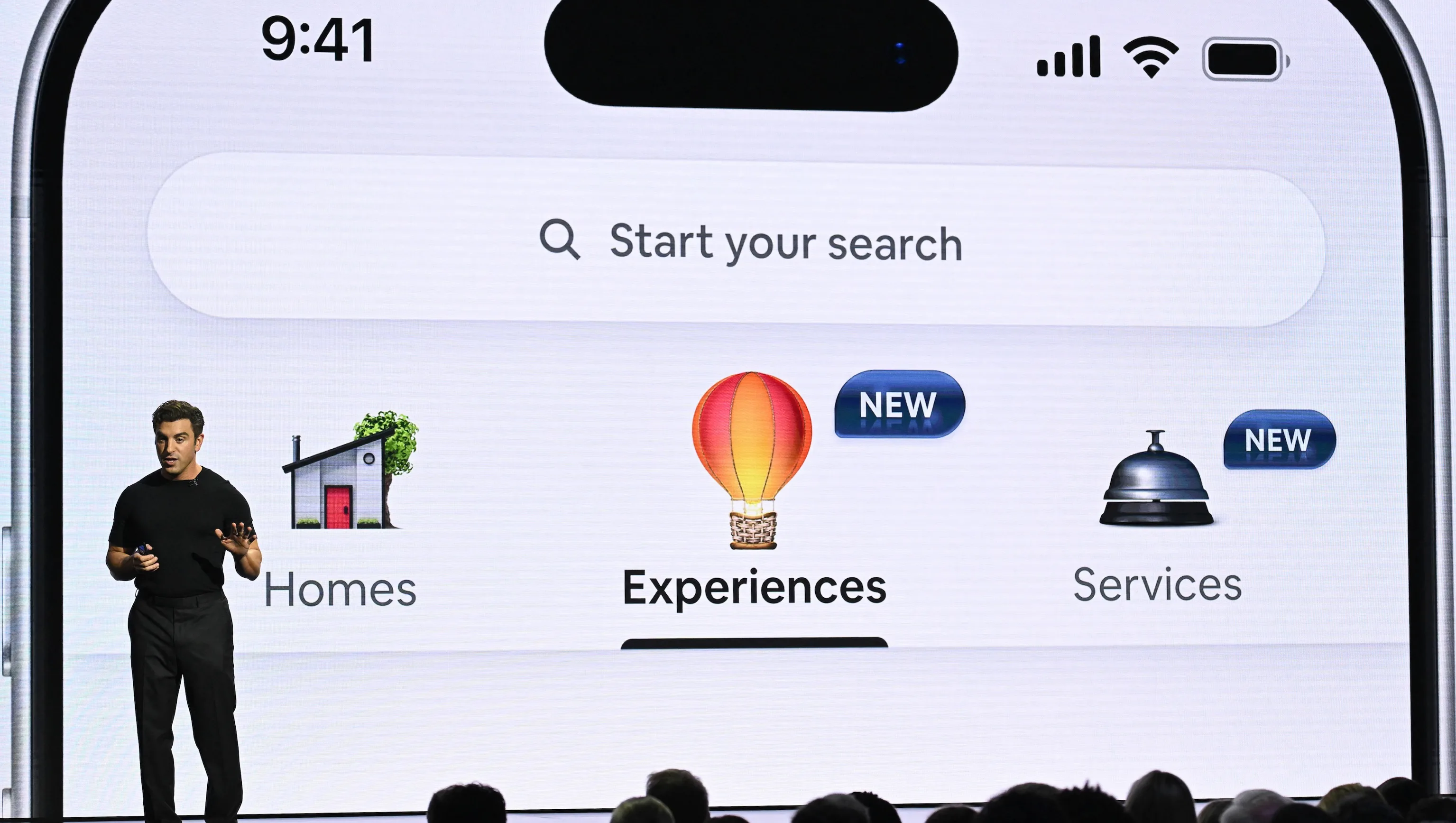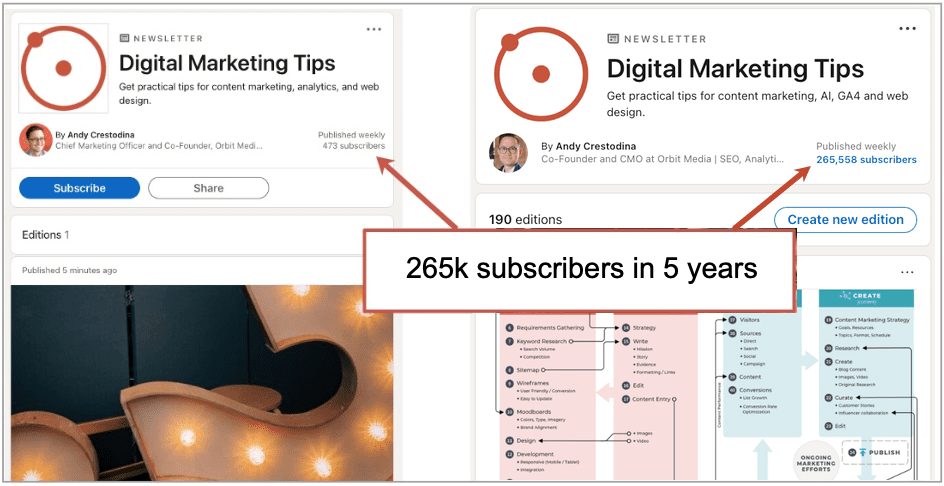Are AI Chatbots Replacing Search Engines? AI vs Google [New Research]
The post Are AI Chatbots Replacing Search Engines? AI vs Google [New Research] appeared first on Orbit Media Studios.
![Are AI Chatbots Replacing Search Engines? AI vs Google [New Research]](https://www.orbitmedia.com/wp-content/uploads/2025/05/How-often-are-we-using-AI-chatbots_.webp)
Feel disrupted by AI? You are not alone.
Big Tech is also disrupted by AI.
AI threatens search engines because AI chatbots are a great way to get answers and do research. After ChatGPT took off, Google went into overdrive to adapt and their response was dramatic. AI overviews now appear at the top of half of all search results. SEOs aren’t happy about this because AI overviews mean fewer clicks on webpages.
But is Google itself getting fewer clicks?
Are visitors skipping traditional search engines and going directly to an AI chatbot app? To answer that question, we partnered with our friends at the survey software company, QuestionPro.
We surveyed 1,040 people in the US from all 50 states, asking about their use of AI chatbots and search engines. Today, here in May 2025, we are sharing the results.
Of course, 1,040 users isn’t a big sample. We surveyed about 0.0004% of total US search engine users. But it’s a quick check of a looming megatrend. Here’s a summary of what we discovered:
- 72% of searchers use Google’s AI Overview when it appears
- Google and Microsoft combined have less than 50% market share
- 62% of people use an AI chatbot everyday
- 51% of chatbot users plan to use them more
- 49% of people think AI will eventually replace search engines
Do people pay attention to AI summaries in search engines?
First we asked about AI summaries at the top of search results. Everyone sees them everywhere. But does everyone read them? No.
We asked “Search engines such as Google now often have AI summarization included in the results. Which of the following best describes your use of these…” About three in four searchers use Google’s AI overview.
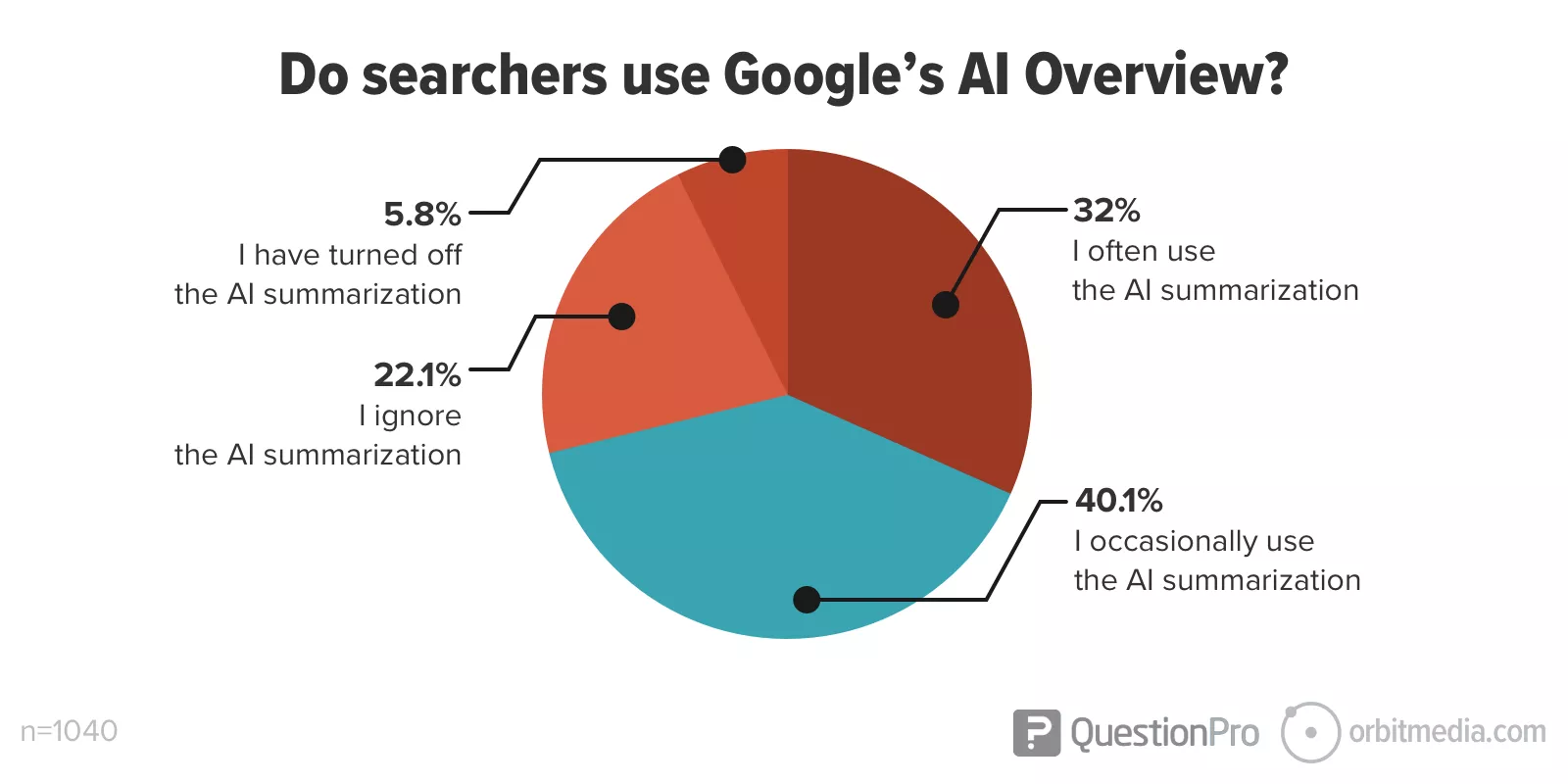
Lots of things appear on search engine results pages. These “SERP features” include featured snippets, “People also ask” boxes, video carousels, maps and ads. They all reduce clickthrough rates. The AI overview is just the latest, but it’s a big one. Research by Seer Interactive found that AI overviews can reduce clicks by as much as 70%.
Before you start panicking, look closely at your own traffic. You may find that the pages impacted by this 10-year trend are really the blog posts which rank for the information intent phrases. Most of those searchers never wanted to visit a website anyway. They just wanted a quick answer.
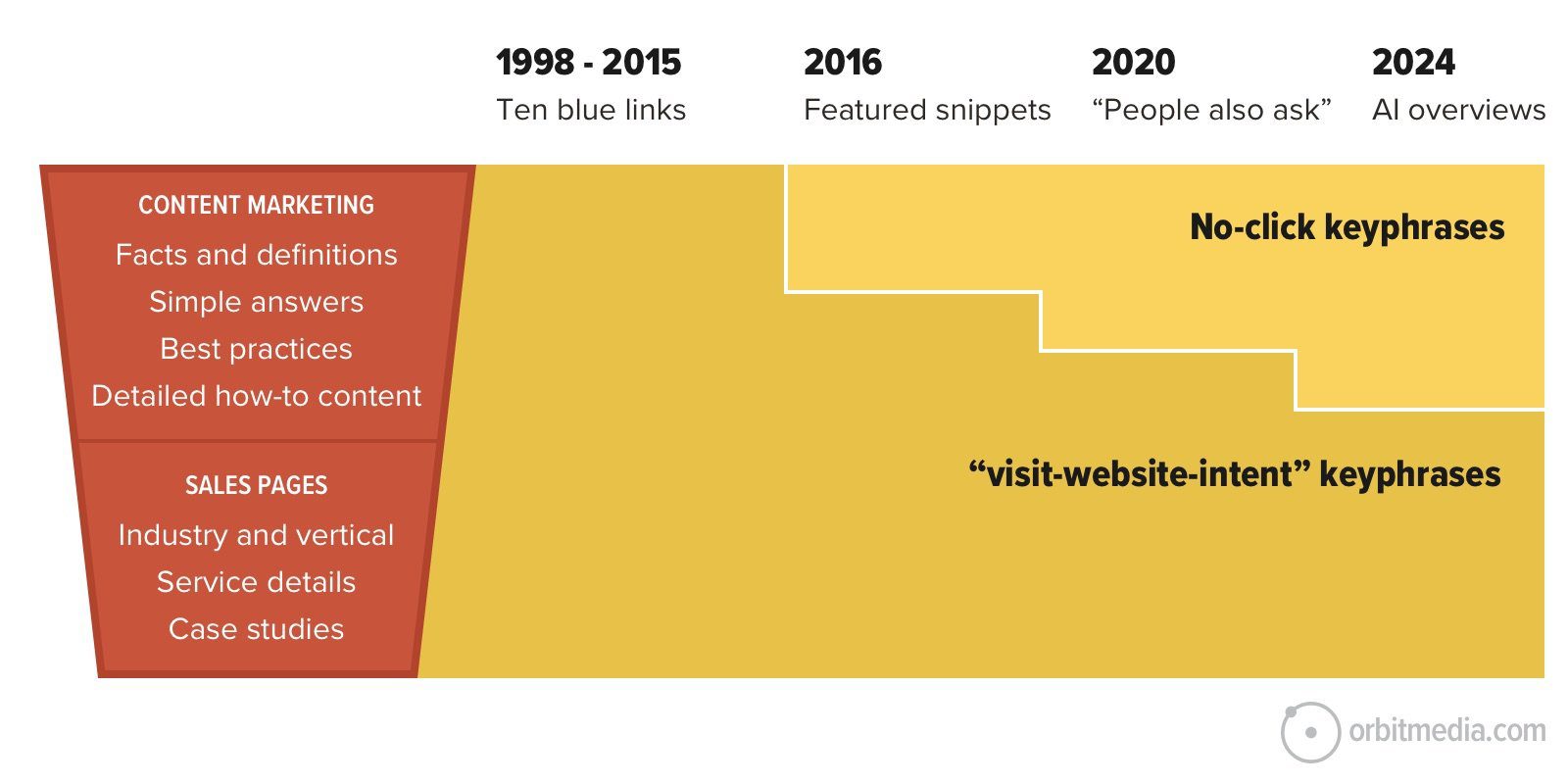
Image source: SEO in the AI Era
Your most important pages (the service pages that promote what you offer) are optimized for commercial intent phrases. Those phases still have “visit website intent.”
Which AI chat tools do people use most?
Next we asked people what AI tools they use. Here AI’s disruption to Big Tech becomes obvious. The most popular tool is one that no one had heard of three years ago: ChatGPT. The big players, Google and Microsoft, have less than 50% market share combined.
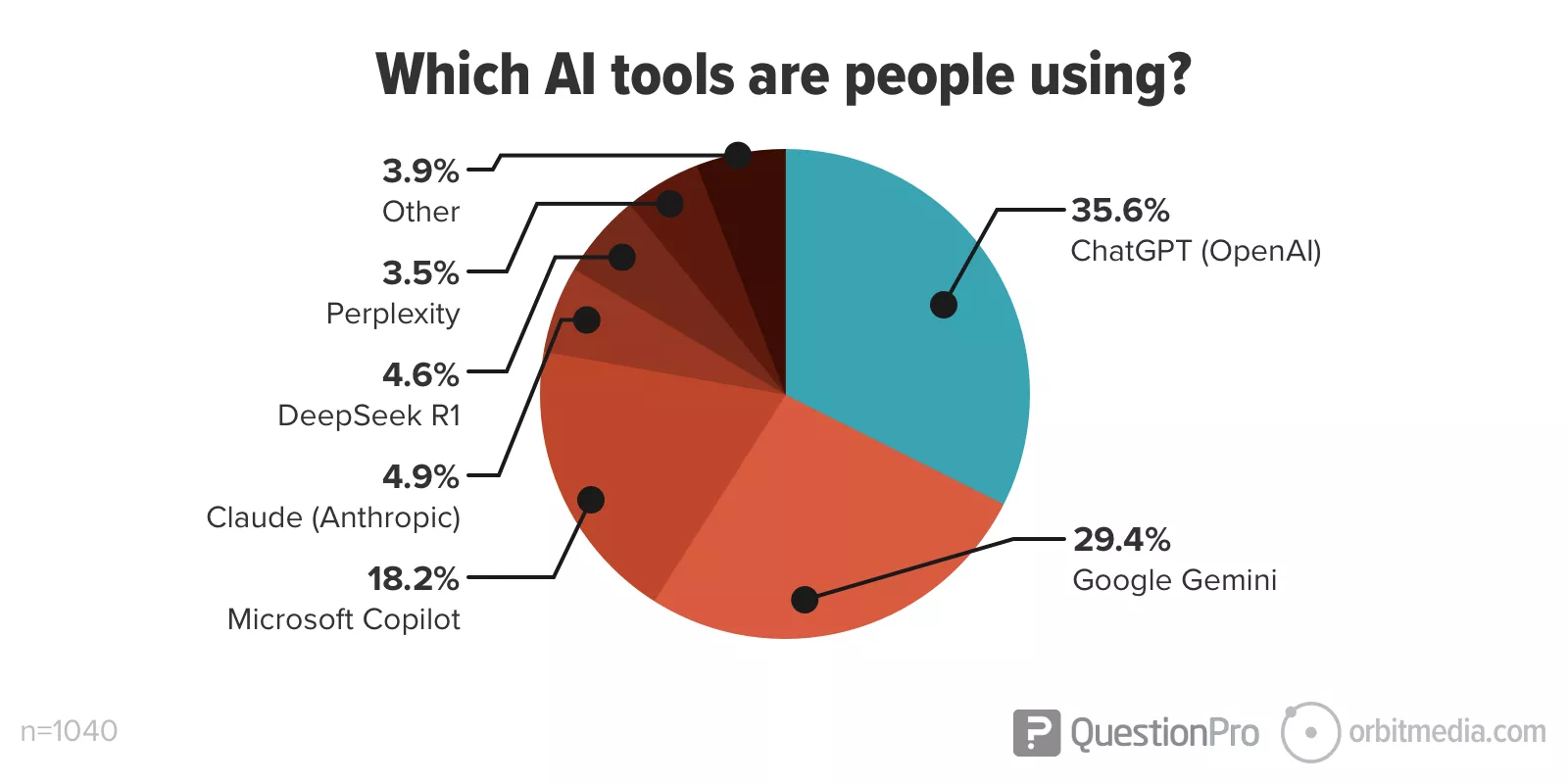
This is what tech disruptions look like. The deck has been shuffled. A new market with new entrants appears and established companies rush to catch up.
How often do people use AI chat tools?
AI is already one of the main tools in people’s lives. How often are we using it? We added this question to the survey. The data is a measurement of the changes in technology, culture and society.
Most people talk to AI chatbots everyday.
That is a huge level of adoption for a technology that only became popular a few years ago. A third talk to chatbots many times per day. Only 1 in 10 respondents aren’t using (or rarely using) AI chatbots.
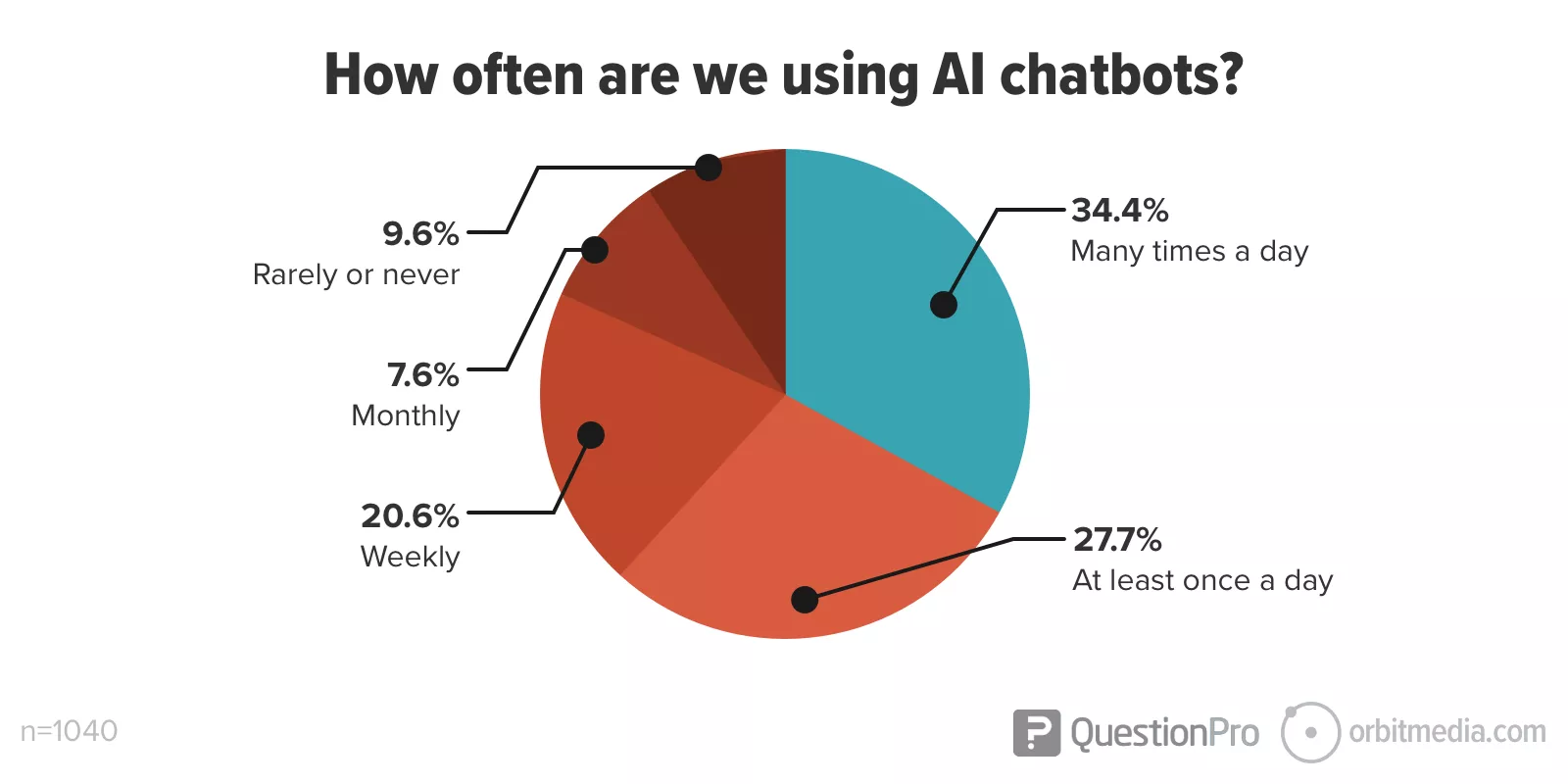 This is a faster adoption rate than social media, smart phones, browsers, PCs, cars or any other technology …since the beginning of technology. In less than two years, AI went from virtually zero users to more than one billion regular users.
This is a faster adoption rate than social media, smart phones, browsers, PCs, cars or any other technology …since the beginning of technology. In less than two years, AI went from virtually zero users to more than one billion regular users.
When do people use search engines vs. AI chatbots?
We are talking to AI chatbots, but what are we talking about?
What kinds of things are we likely to ask an AI?
Which are the most popular use cases?
It’s an important question for marketers. As I mentioned above, in SEO, some phrases have “visit website intent” and some do not. Understanding the intent of the searcher is the key to keyphrase research. The same is true for AI. We need to understand when visitors use it if we want to capture opportunities to be discovered and grow.
We asked respondents when they are likely to use a search engine and when they are likely to use an AI chatbot. Query or prompt? Google or ChatGPT?
The data shows that we still generally use search engines when we need information. But we do sometimes go straight to an AI app. And for some use cases, we are much more likely to reach for a chatbot.
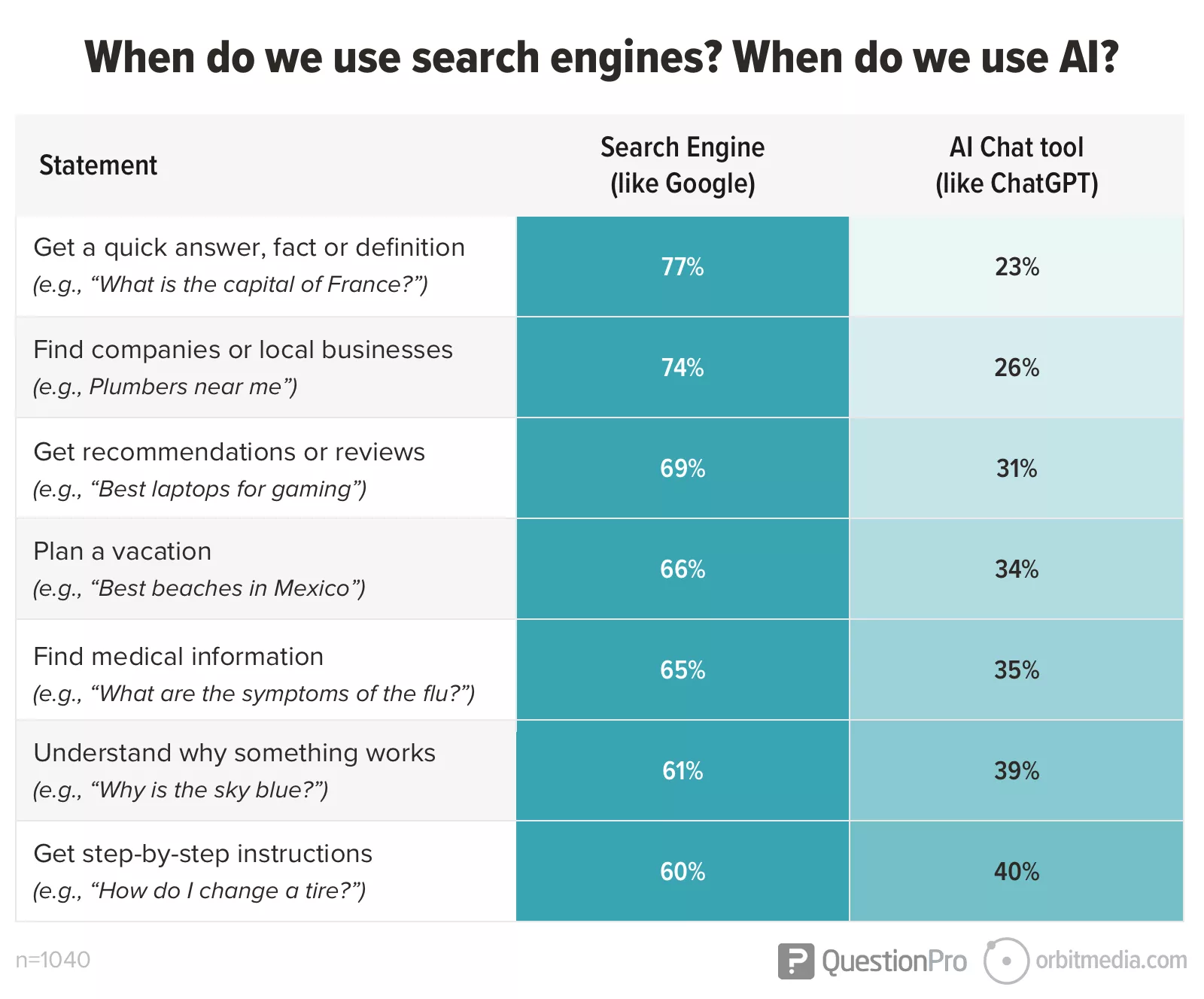
Google wins for quick answers. Looking for a local restaurant? See the reviews? Google’s got you covered. But the more complex the use case, the more likely a conversation is better than a search result. Answer generation is better than information retrieval.
- Low recall queries to find things when you’re not sure how to search (“Who was the guy in the thing…?”)
- Multiparameter search (“Event venues in Chicago with river views, vegan options and are women owned”)
- Low confidence the information exists (“Make a table showing reading level for all Dr. Suess books”)
- Information that is part of a multistep process (“How to write a proposal for a school play? Now write it…”)
 |
Jes Scholz, Marketing Consultant and SEO Futurist“AI chat isn’t about replacing Google, so much as expanding search into new areas. AIs provide a place to ask all the complex, multi-part questions that traditional search could not answer. And as features such as memory are improved, and agentic capabilities are added, they will undoubtedly become a core aspect of our digital lives. But always as an addition alongside traditional search, which serves different purposes. Just as it happened with social media and traditional search a few decades ago.” |
AI also offers more privacy, fewer ads, less visual noise at greater speeds. But it also has distinct advantages for specific use cases. The data shows a pattern:
The more information we need, the more likely we are to use AI over Google.
This has implications for B2B brands. It’s increasingly likely that prospects will use AI for help researching decisions. They may start with Google to find initial options. They may look at websites before making a final decision. But somewhere along the buyer journey, they are likely to ask AI for help.
Are we ready for AI answers to everything?
Will we switch away from traditional search?
Do we trust AI for answers? More than Google?
Can we imagine AI replacing search in our daily lives?
To check the overall sentiment toward AI and traditional search, we ended the survey with a set of statements and asked respondents if they agreed and to what extent. This helps us look ahead at the “Google vs. AI” question.
The results show an open-mindedness. For each statement, “neutral” was the most common response. And strong agreement and disagreement balanced each other in most cases.
We are open to new ways to get information.
Here are two results that highlight the coming challenge for traditional search engines.
- 51% of chatbot users plan to use them more
- 49% of people think AI chat tools will eventually replace search engines
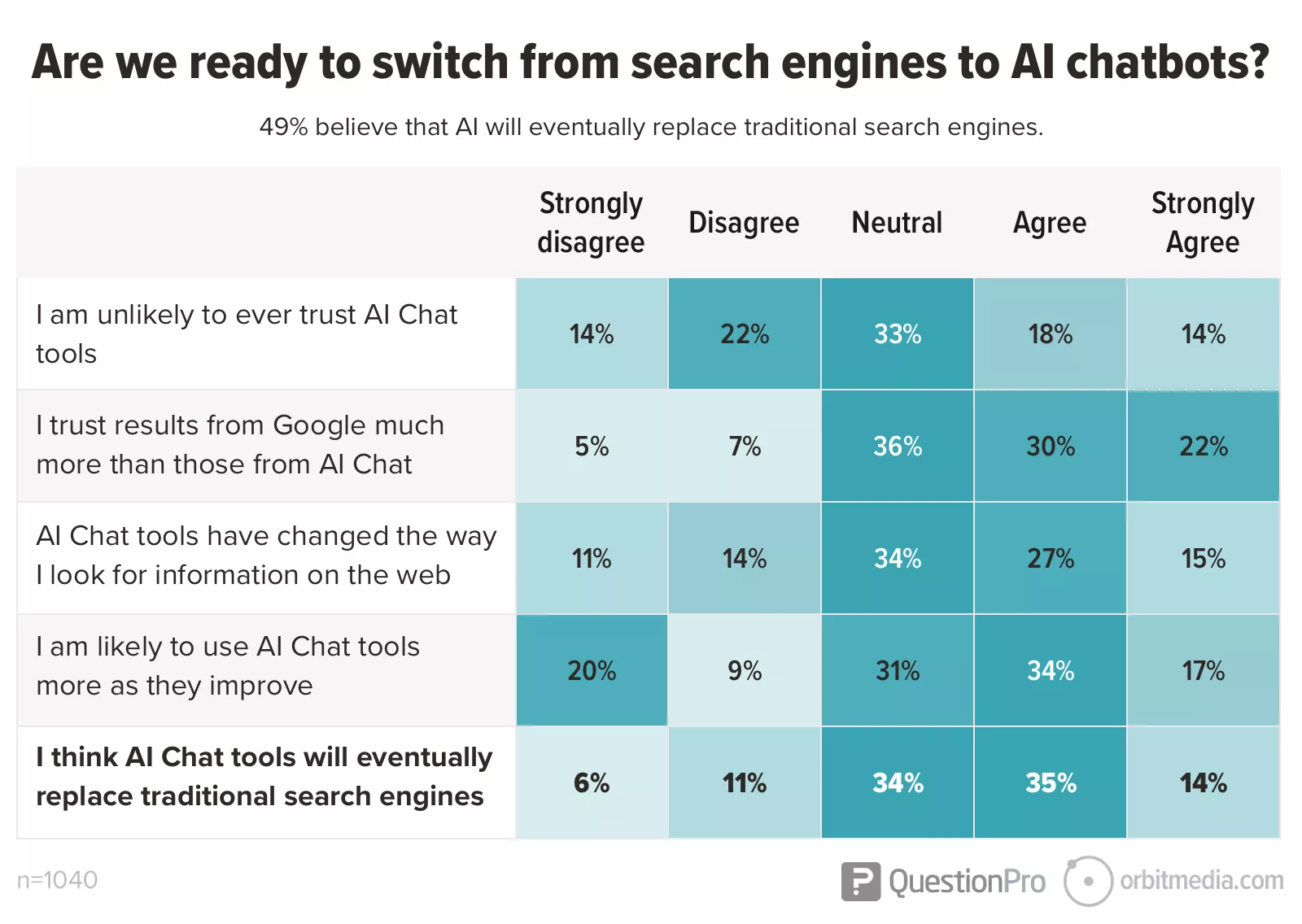
 |
Cyrus Shepard, Zippy SEO“The data is revealing in that 49% of folks believe AI Chat will replace traditional search (vs 17% disagree.) Google is increasingly providing AI answers to get ahead of this demand. The question for businesses and publishers is how best to adapt to these inevitable shifts. Long-term, the answer may be for publishers to lean into the type of content they excel at: first-party data or product information, original research (like this!), real-time information, local knowledge, and expert/first-person perspectives. People will still visit websites, but we may need to shift and improve the types of experiences we offer.” |
This data is less alarming than it looks. For starters, like any survey, this is attitudinal data (what people say) and not behavioral data (what people do) so we should be a bit skeptical. But also, because AI overviews are already in search engines, AI chat tools have already replaced traditional search engines. That trend is already here.
But bigger changes may still be coming. Imagine a world where you all get most of your answers by talking to an AI agent. It knows you well. It does the research for you. It lines up options and then you step in for the final decision.
 |
Karine Abbou, Strategist, Advisor and Founder of Women Love AI Marketing“We are witnessing the birth of a new web: a web entirely rewritten by AI. This is a revolution. A real one. The entry into another economy and the emergence of a new business model for the web. This kind of transition takes time. But everything is evolving. And very quickly. This results in a particular challenge for marketers in charge of developing digital marketing strategies, who now face difficult choices: invest in digital marketing tactics that still work and will certainly continue to work for some time to obtain short-term results (e.g., traditional SEO practices, traditional blog post writing, usual content repurposing methods, etc.) AND/OR invest in those predicted to work tomorrow (AI agent development, investments in forums, in-depth research and publish on other websites, such as on sites like Arxiv or Github). The choice will be made case by case, and the uncertainty of obtaining results will be greater than ever.“ |
Are people using search engines less because of AI?
SEO is dead. I read the headline. I’ve read that headline every few months for 10 years. Is it finally true?
If people are switching away from Google and to AI, we should see it in the data. We should see it in this survey and in related studies. We asked the question, “How has your use of Search Engines (like Google) changed since AI Chat tools have been available?”
The data doesn’t show a lot of switching. In fact, it looks like we’re searching more. I guess old habits die hard.
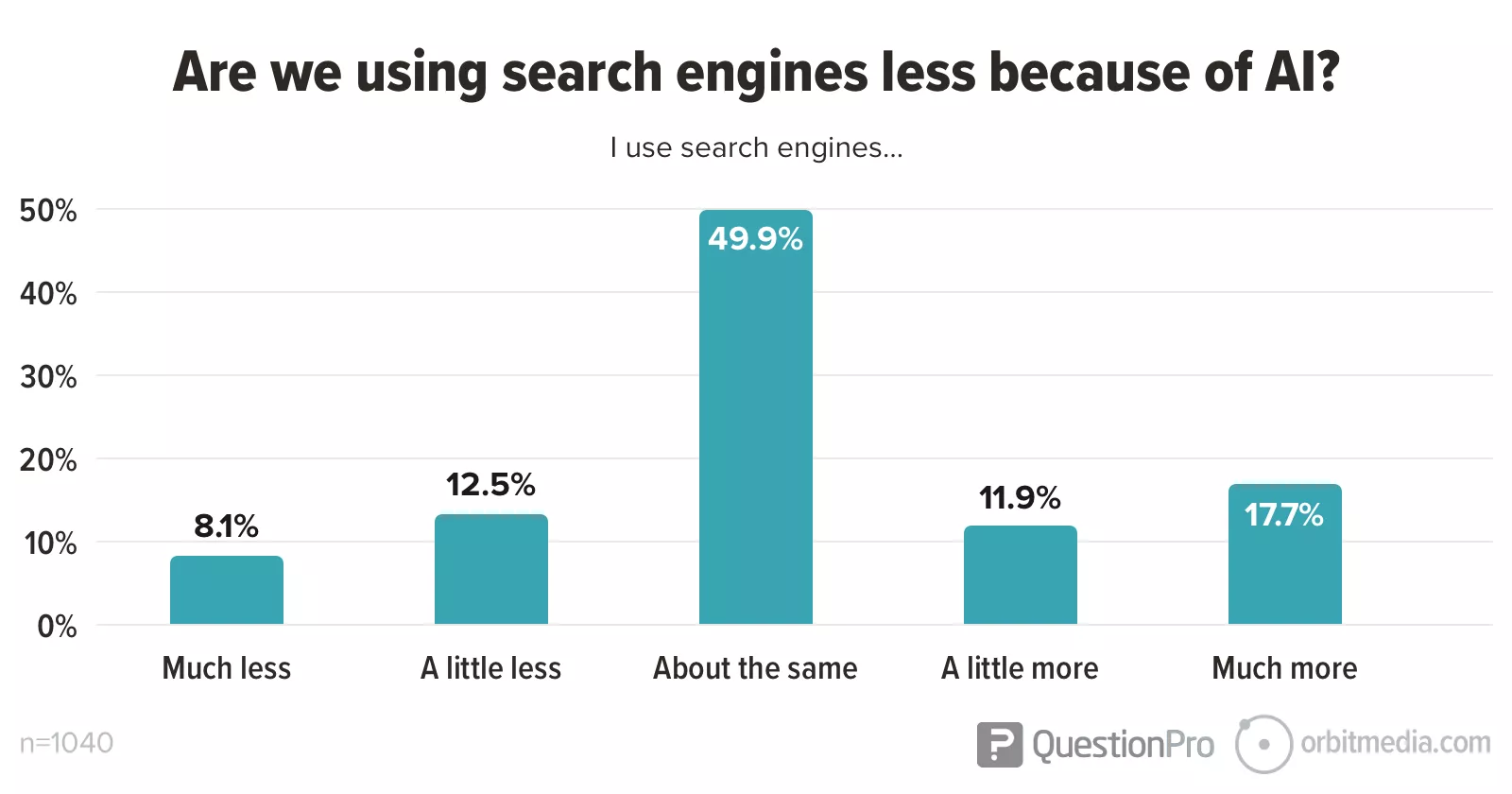
Other research support this. Sparktoro partners with Datos to analyze clickstream data, and found that across all categories, people are using Google more than ever. In 2024, Google searches were up 22% year over year.
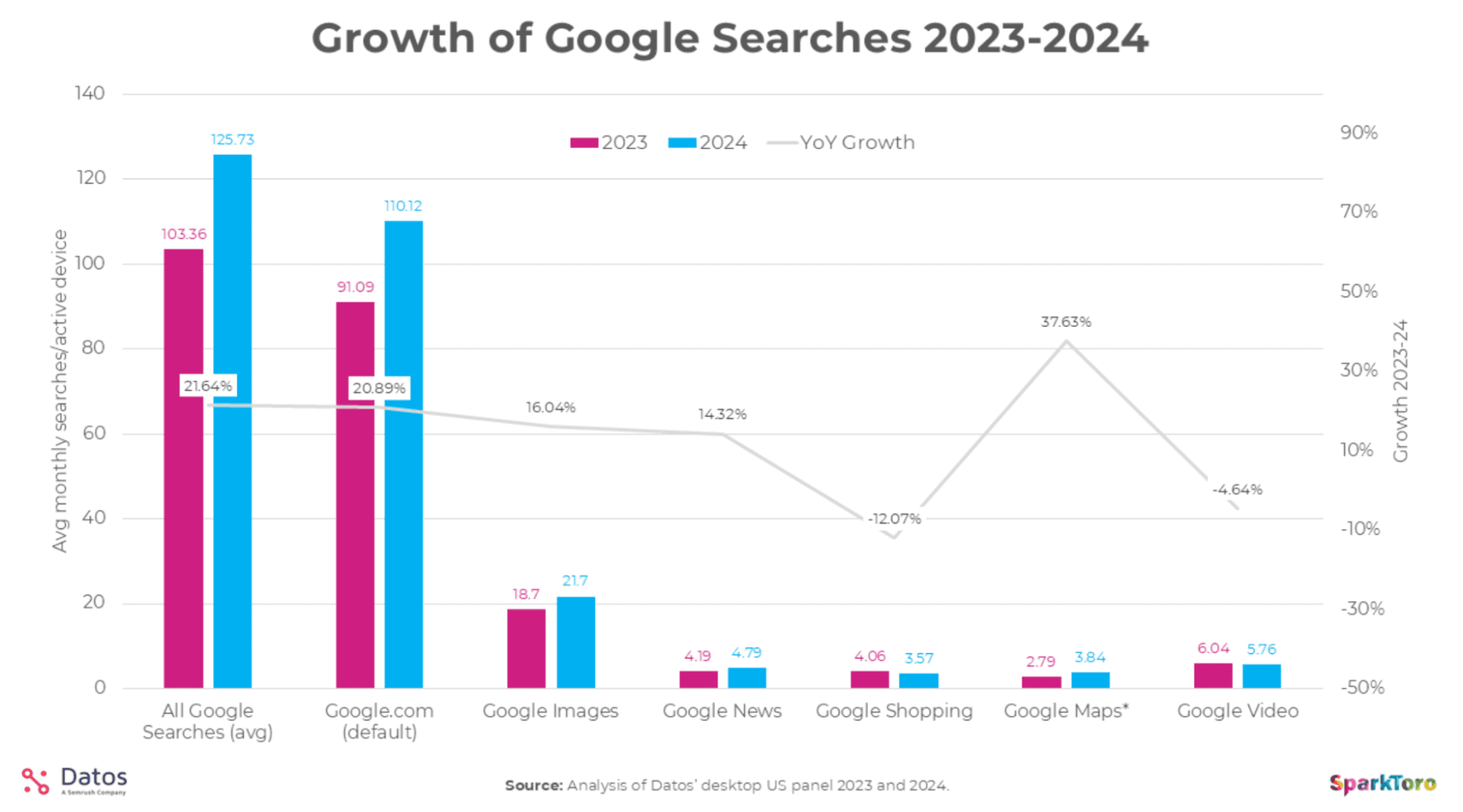
Search isn’t dead. It’s not dying. It may even be growing.
But the use of AI is growing faster. You can see it for yourself in your own website traffic.
To see traffic from AI services to your website, create a GA4 exploration with a segment for AI referrers. Traffic will look low, but keep in mind that this report can’t catch visitors from AI apps, which are categorized as direct. But look at the growth. It’s the beginning of a megatrend.
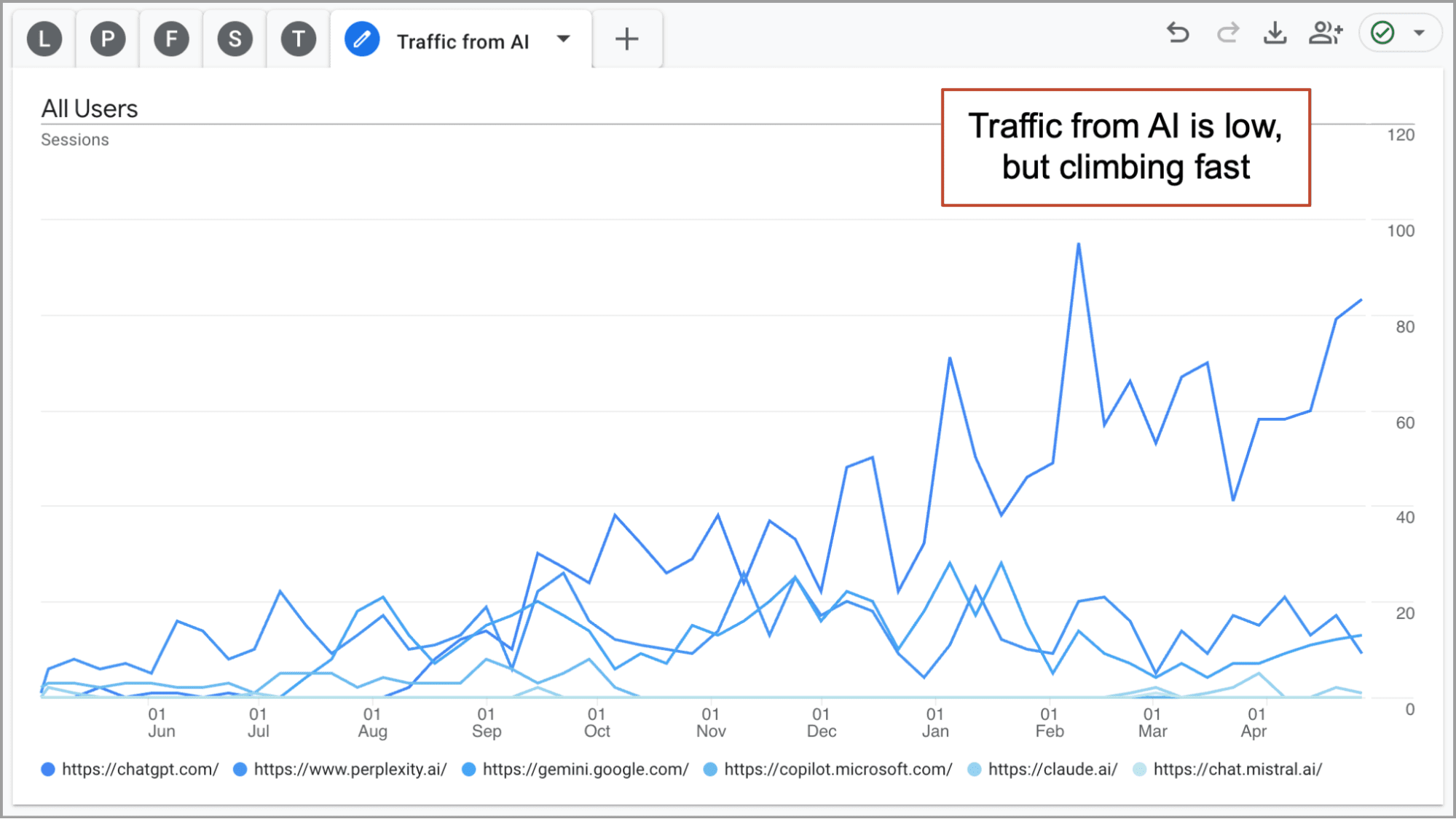
Take a minute to imagine a world where AI Chatbots have at least partly replaced Google.
What will change?
- The use of browsers will decline
- Ads will appear within AI responses for the users of the free versions
- B2B buyers ask AI to recommend partners? “Make me a buyer’s guide for…”
- Digital agencies will help clients optimize for discovery in AI responses (doing these things)
What won’t change?
- Content marketing (thought leadership, email, social, sales/marketing alignment)
- Word of mouth marketing
- Live events and communities
- Influencer marketing
- The goal of being found by people who need your insights (content) or help (services)
Channels have changed many times over the last 30 years. But smart brands have always found ways to be discovered, build trust and drive demand.


